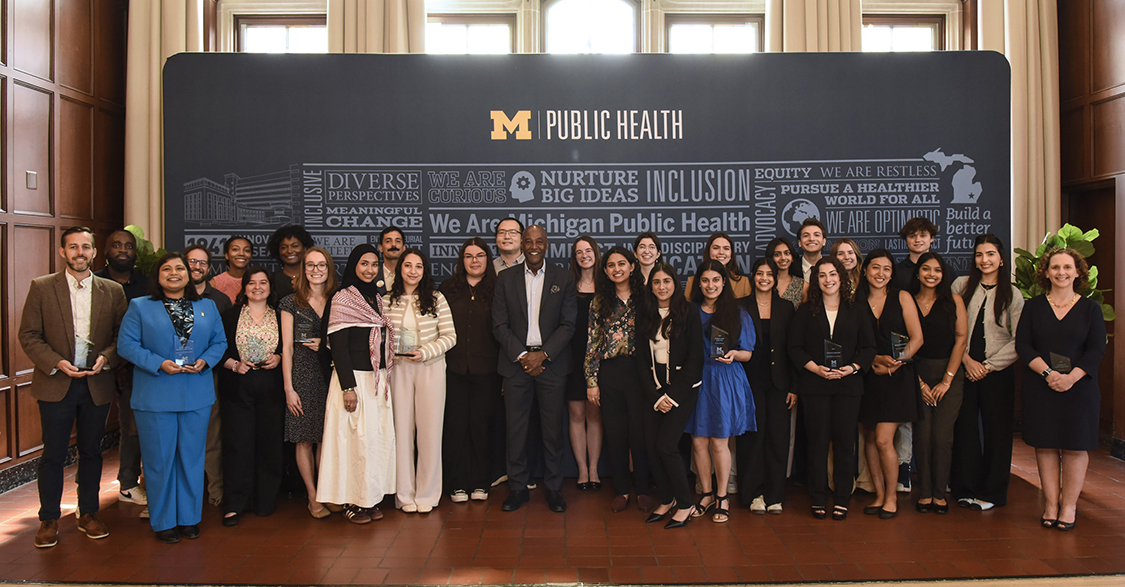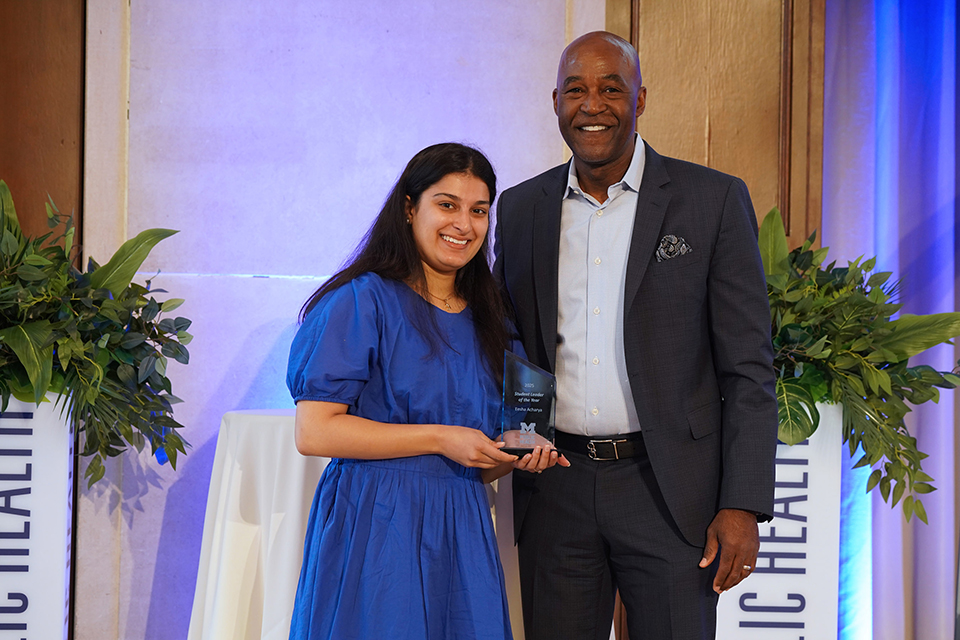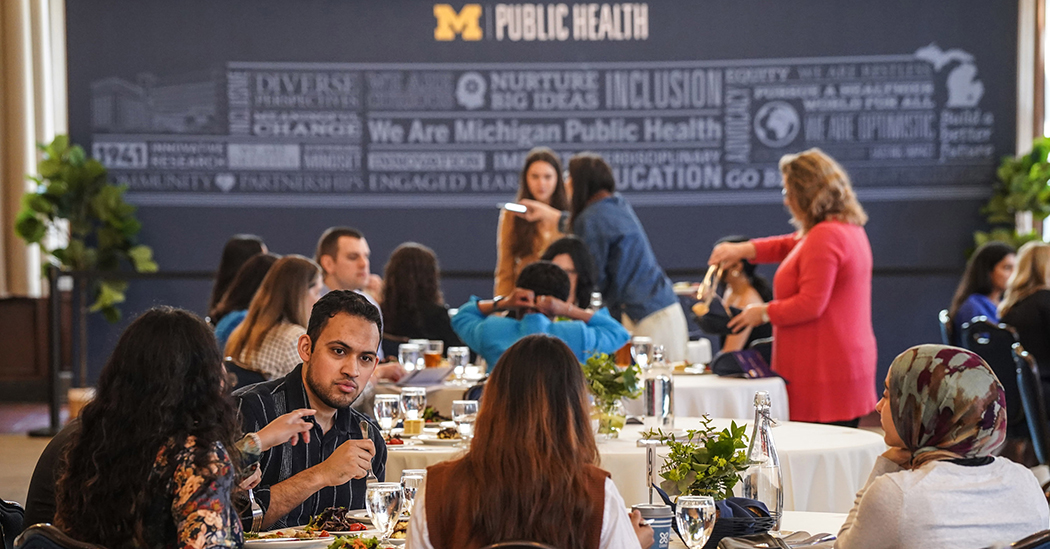Michigan Public Health celebrates faculty, staff, students for excellence

ANN ARBOR— Students, faculty and staff from the University of Michigan School of Public Health were commended during the fourth annual Public Health Honors on April 23.
The event, held at the Rogel Ballroom in the Michigan Union, recognized the outstanding efforts and achievements of individuals who have exceeded expectations in the areas of public health research, education, community service and public engagement.
“I’m so pleased to have this time together to celebrate such incredible members of the Michigan Public Health community,” Dean F. DuBois Bowman said. “Today, we recognize the many different types of exceptional work that happen at our school. This includes the work we do to shape the field of public health, drive innovative research, provide a world-class education and improve well-being for all people.”
Excellence in Public Engagement
Kate Bauer’s remarkable contributions to public health over the past year earned her the inaugural Excellence in Public Engagement Award. Bauer’s leadership in expanding the reach of vital resources has made a significant impact on community food security across the state of Michigan.
“At this time, it is so critical that we who hold knowledge and know the truth, are the ones out there in public ending misinformation,” said Bauer, associate professor of Nutritional Sciences. “I’m really honored to have this award that showcases those efforts.”
She launched the FeedingMIFamilies.org website, disseminating critical project findings to more than 500 Michigan leaders and organizations. By engaging with the Michigan Farm Bureau’s county bureaus and facilitating discussions at the Michigan Good Food Charter Policy Action Forum, she has driven collaborative efforts to improve food options for families.
Her statewide partnerships with organizations such as Fair Food Network and United Way of Michigan have provided valuable data to support needs assessments and grant applications, empowering these organizations to make meaningful change.
Bauer also plays a vital role in raising awareness through media engagement. Her insights on food insecurity were featured in major outlets, achieving over 150 media mentions and reaching an audience of millions.
“Kate’s dedication and innovative approach exemplify excellence in public health, inspiring us all to make a difference,” said Karen Peterson, the Stanley M. Garn Collegiate Professor of Nutritional Sciences and chair of the department.
PROSPECTIVE STUDENT? Learn more about Michigan Public Health.

Excellence in Teaching Award
Teaching and training are the cornerstones of Michigan Public Health. Each year, the school’s programs attract students with diverse experiences and backgrounds, all eager to learn how they can make a difference in the world. World-class faculty work diligently to ensure impact in the classroom, lab and field.
Dave Bridges, associate professor of Nutritional Sciences, known for his innovative and student-centered teaching methods, received the Excellence in Teaching Award.
Bridges has redefined the school’s curriculum with his dedication to fostering an inclusive and dynamic learning environment. His course, Nutritional Sciences 630: Principles of Nutrition, is a testament to his impactful teaching. This essential and challenging course covers complex topics such as macronutrient metabolism and gastrointestinal physiology.
“Curiosity is what drives my approach to teaching and my approach to learning,” he said. “I really want to understand things and I really want to solve the puzzle that is learning. Puzzles are best solved when you do it together. And that’s what learning is—we’re solving a problem together. When I can advance somebody’s understanding of nutrition, we leave that interaction way stronger than we started.”
To address diverse student backgrounds, Bridges has pioneered an equitable teaching approach through gameful learning, allowing students to engage actively and tailor their educational journey. This inclusive model has broadened the course’s appeal, drawing in students annually from various disciplines beyond just dietetics, including kinesiology and pharmacy.
“Dave is an exceptional educator in the Department of Nutritional Sciences,” said Olivia Anderson, clinical associate professor of Nutritional Sciences. “Beyond his innovative curriculum design, Dave is celebrated for his approachability and dedication to student success. His open-door policy offers personalized mentorship, and he actively nurtures graduate students in their roles as instructors.
“In a constantly evolving educational landscape, Dave exemplifies adaptability and excellence through his commitment to innovative teaching and student success.”
READ MORE about faculty, students, alumni and staff.
Curiosity is what drives my approach to teaching and my approach to learning. “I really want to understand things and I really want to solve the puzzle that is learning. Puzzles are best solved when you do it together. And that’s what learning is—we’re solving a problem together. When I can advance somebody’s understanding of nutrition, we leave that interaction way stronger than we started.”
— Dave Bridges
Excellence in Research Award
Jian Kang, professor of Biostatistics, was honored with the Excellence in Research Award. Since joining the Department of Biostatistics in 2015, Kang has distinguished himself in Bayesian statistics, neuroimaging and biomedical data science, introducing innovative methodologies that have global impact.
Renowned for pioneering work in biomedical imaging statistics, Kang’s methods have significantly enhanced the interpretation of complex neuroimaging data. His groundbreaking contributions to EEG-based, brain-computer interfaces and collaborations backed by the National Institutes of Health and National Science Foundation funding exemplify his influence in neuroscience and biomedical research.
In statistical machine learning, his development of interpretable frameworks has been crucial for medical applications, improving clinical trials and data analysis accuracy. His research has made pivotal contributions to cancer studies, mental health and infectious disease modeling, notably advancing public health practice.
Beyond research, Kang excels as a mentor, guiding more than 20 PhD students and postdoctoral fellows to achieve significant success. His leadership in the Big Data Summer Institute prepares future researchers for challenges in data science.
“As associate chair for research—and my second brain—Professor Kang shapes departmental strategies and contributes extensively to editorial boards and professional organizations, demonstrating his commitment to advancing statistical scholarship,” said Veera Baladandayuthapani, the Jeremy M.G. Taylor Collegiate Professor of Biostatistics and chair of the department. “His dedication and contributions are a vital force, advancing public health research and inspiring peers and students alike—Jian Kang is one of the kindest, generous and smartest individuals I know.”

Excellence in Practice Award
Paul Fleming, associate professor of Health Behavior & Health Equity, received the Excellence in Practice Award for advancing public health practice through his roles as Faculty Lead for Diversity, Equity, and Inclusion and as principal investigator of the Future Public Health Leaders Program.
Thanks to Fleming’s commitment to experiential learning, his students engage with local organizations to tackle real-world health equity challenges. This hands-on approach empowers students to develop grant proposals for the Michigan Health Endowment Fund, benefiting over 30 community organizations.
Beyond his classroom innovation, Paul supports educators through resources like “Health Equity via Anti-Racist Teaching.” His research addresses critical racial health inequities within the Latinx community, collaborating with organizations such as Detroit’s CHASS Center to create impactful solutions.
His dedication to anti-racist practices has led to tools such as the Racial Justice Impact Assessment, currently being piloted in Washtenaw County. Projects like Project HEARD highlight his commitment to fostering community-led policy changes that promote health equity.
Extending his impact beyond academia, his newsletter “Making a Better World Possible,” and upcoming book, “Imagine Doing Better,” communicate his vision for sustainable, equitable change.
“Paul is a passionate mentor, guiding the next generation of public health leaders with opportunities for hands-on experience and research,” said Laura Power, director of the Office of Public Health Practice. “His visionary work and unwavering dedication inspire us all to imagine and create a better world.”
Eugene Feingold Excellence Award
Michigan Public Health annually recognizes community members with the Feingold Excellence in Diversity awards. Eugene Feingold, a former professor of Health Management & Policy, was involved in community organizations focused on civil liberties, poverty, and racial discrimination.
The award celebrates faculty, staff, and students who exemplify an “extraordinary dedication to developing diversity.”
This year, Bambarendage Pinithi “Pini” Perera, research assistant professor of Environmental Health Sciences (faculty); Peter Slutzker, research area specialist of Health Behavior & Health Equity (staff); and Izza Ahmed-Ghani, an MHSA/MPH student in Health Management & Policy and Health Behavior & Health Equity (student); were recognized with the award.
Since joining Michigan Public Health in 2018 as a postdoctoral fellow, Perera has played a key role in advancing educational equity. Initially invited by the University of Michigan Center for Research on Learning and Teaching (CRLT) to lead a short course on this subject, she now serves as an Environmental Health Sciences faculty member, delivering first-year MPH professional development courses using innovative and inclusive methods that receive outstanding feedback.
As co-chair of the EHS Community Engagement Committee, she initiated a year-long faculty training on educational equity with CRLT. Additionally, Perera leads impactful workshops, organizes community outreach events like DNA Day, and supports inclusive recruitment efforts.
Slutzker advances significant projects in Detroit and internationally. Collaborating with K. Rivet Amico, associate chair and professor of Health Behavior & Health Equity, on health equity initiatives, he demonstrates a strong commitment to community engagement and capacity-building. Slutzker has been instrumental in developing meaningful partnerships, particularly in projects addressing stigma in people living with HIV, and has empowered counselors and researchers in seven countries.
His leadership in qualitative analysis groups ensures inclusivity and values every participant's voice. As a mentor, Slutzker supports students from diverse backgrounds with humility and kindness. His contributions to the DEI committee have enhanced indigenous visibility and partnerships at Michigan Public Health. Additionally, his role on Ann Arbor’s Housing and Human Services Advisory Board illustrates his dedication to equity beyond the academic sphere.
SUPPORT research and engaged learning at Michigan Public Health.
At this time, it is so critical that we who hold knowledge and know the truth, are the ones out there in public ending misinformation. I’m really honored to have this award that showcases those efforts.”
— Kate Bauer
As co-president of the Muslim Students of Public Health, Ahmed-Ghani worked with the Michigan Public Health DEI Office to secure a larger Reflection Room and raise awareness about Ramadan challenges, fostering a more inclusive environment. She organized a highly successful Iftaar event, the largest school gathering of the year.
Ahmed-Ghani also coordinated student participation in the 2024 American Muslim Health Professionals Conference, securing funds for 15 students and building community ties across departments. As DEI Chair of the Public Health Student Assembly, she improved communications and adapted practices for better inclusion. Her support for students of diverse backgrounds ensures they feel welcomed and supported.
Other award winners
- Excellence in Practice Through Service-Student Award: Allison Baumgartner, an MPH student in Global Health Epidemiology
- Student Leader of the Year Award: Eesha Acharya, a BA student in Community and Global Public Health
- Rising Star: Laura Arboleda-Merino, a PhD student in Epidemiological Science
- Unsung Hero Award: Amina Dada, an MHSA student in Health Management & Policy
- Outstanding Graduate Student Instructor: Justice Akuoko-Frimpong, a PhD student in Biostatistics
- Student Organization of the Year: Epidemiology Doctoral Student Organization
- Outstanding Event of the Year Award: MENAPH’s “Destruction of Health Under Genocide”
- Community Engagement Award: Global Surgery Student Alliance
- Rising Organization Award: Bountiful Pantries
